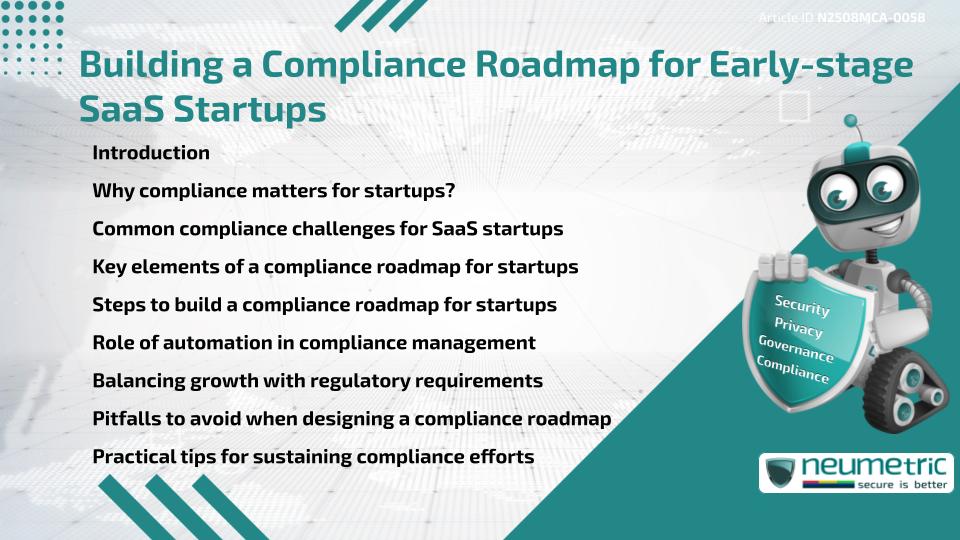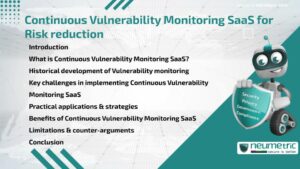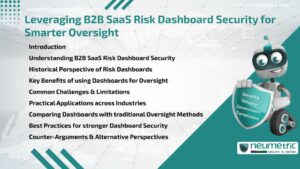Table of Contents
ToggleIntroduction
Startups in the Software as a Service [SaaS] industry often prioritise growth, Customer acquisition & product development. However, neglecting compliance can lead to fines, reputational damage & lost investor confidence. A compliance roadmap for startups provides structured guidance to meet Regulatory Standards while supporting business growth. This article explores why compliance matters, common challenges for SaaS startups, essential elements of a compliance roadmap & practical steps for early-stage companies to succeed without being overwhelmed by regulatory demands.
Why compliance matters for startups?
Compliance ensures that startups operate within legal frameworks & build Customer Trust. For SaaS businesses, compliance is not only about following laws but also about safeguarding Sensitive Data & ensuring transparency. Investors & enterprise clients often require proof of compliance before signing contracts. A well-structured compliance roadmap for startups is therefore both a legal necessity & a strategic advantage.
Common compliance challenges for SaaS startups
Early-stage SaaS companies often face hurdles such as:
- Limited resources: Small teams may lack dedicated compliance staff.
- Complex regulations: Frameworks like General Data Protection Regulation [GDPR], Health Insurance Portability & Accountability Act [HIPAA], or Payment Card Industry Data Security Standard [PCI DSS] can be difficult to interpret.
- Rapid scaling: Growth introduces new Risks, including cross-border data transfers.
- Documentation gaps: Startups frequently underinvest in record-keeping & Policies.
These challenges underscore the importance of building a compliance roadmap for startups at an early stage.
Key elements of a compliance roadmap for startups
A successful roadmap should include:
- Regulatory identification: Determining which laws & frameworks apply.
- Risk Assessment: Identifying areas most likely to expose the company to non-compliance.
- Policies & controls: Creating clear internal Policies, Access Controls & monitoring practices.
- Training Programs: Educating Employees on compliance responsibilities.
- Monitoring & reporting: Establishing ongoing processes for audits & reviews.
Together, these elements form the backbone of a compliance roadmap for startups.
Steps to build a compliance roadmap for startups
Startups can follow these structured steps:
- Assess obligations: Identify regulations relevant to industry, geography & customers.
- Prioritise Risks: Focus first on high-impact areas like Data Privacy & security.
- Draft Policies: Document internal practices aligned with legal requirements.
- Implement controls: Use technical & administrative measures to reduce Risks.
- Train teams: Provide regular training sessions for Employees & contractors.
- Leverage audits: Conduct periodic reviews to strengthen weak areas.
By following these steps, startups create a compliance roadmap for startups that grows alongside their business.
Role of automation in compliance management
Manual compliance tracking can overwhelm small teams. Automation tools simplify tasks such as access monitoring, incident reporting & document version control. For SaaS companies, automation ensures that compliance efforts remain efficient & scalable. Integrating automated workflows into a compliance roadmap for startups also reduces errors & frees up resources for product development.
Balancing growth with regulatory requirements
Startups often worry that compliance will slow growth. However, a compliance roadmap acts as a growth enabler by building trust with investors, customers & regulators. Instead of viewing compliance as a barrier, founders should treat it as part of their value proposition. Early compliance practices also minimise the cost of retroactive fixes, which can be far higher than upfront investment.
Pitfalls to avoid when designing a compliance roadmap
Many startups fall into traps such as:
- Ignoring compliance until fundraising or an Audit is imminent.
- Copying Policies from larger firms without tailoring them.
- Treating compliance as a one-time project rather than an ongoing process.
- Relying solely on external consultants without building in-house knowledge.
Avoiding these pitfalls helps startups develop a compliance roadmap for startups that is both realistic & effective.
Practical tips for sustaining compliance efforts
To sustain compliance efforts over time, startups should:
- Establish compliance as part of company culture.
- Regularly update Policies as regulations evolve.
- Designate a compliance champion or officer within the team.
- Document everything for Audit readiness.
- Review automation tools annually for effectiveness.
Embedding these practices ensures that compliance remains strong as the company scales.
Takeaways
- Compliance is vital for legal, financial & reputational stability.
- Startups face unique compliance challenges due to limited resources & fast growth.
- A compliance roadmap for startups includes regulatory identification, Risk Assessment, Policies & training.
- Automation can reduce manual workload & enhance accuracy.
- Long-term compliance success depends on culture, monitoring & continuous updates.
FAQ
What is a compliance roadmap for startups?
A compliance roadmap for startups is a structured plan that outlines how a company will meet legal, regulatory & industry-specific requirements.
Why is compliance important for SaaS startups?
Compliance protects Customer Data, reduces legal Risks & helps startups gain investor & Client trust.
Which regulations should SaaS startups focus on first?
Startups should focus on Data Protection & security regulations such as GDPR, HIPAA or PCI DSS, depending on their industry.
How can automation help startups with compliance?
Automation simplifies monitoring, reporting & documentation, making compliance more efficient & scalable for startups.
Do early-stage startups need a dedicated compliance officer?
Not always. Smaller startups can assign compliance responsibilities to a team member before hiring a dedicated officer as they grow.
What are common mistakes in building a compliance roadmap?
Compliance builds trust, opens doors to enterprise clients & reduces Risks, enabling smoother & faster growth.
Need help for Security, Privacy, Governance & VAPT?
Neumetric provides organisations the necessary help to achieve their Cybersecurity, Compliance, Governance, Privacy, Certifications & Pentesting needs.
Organisations & Businesses, specifically those which provide SaaS & AI Solutions in the Fintech, BFSI & other regulated sectors, usually need a Cybersecurity Partner for meeting & maintaining the ongoing Security & Privacy needs & requirements of their Enterprise Clients & Privacy conscious Customers.
SOC 2, ISO 27001, ISO 42001, NIST, HIPAA, HECVAT, EU GDPR are some of the Frameworks that are served by Fusion – a SaaS, multimodular, multitenant, centralised, automated, Cybersecurity & Compliance Management system.
Neumetric also provides Expert Services for technical security which covers VAPT for Web Applications, APIs, iOS & Android Mobile Apps, Security Testing for AWS & other Cloud Environments & Cloud Infrastructure & other similar scopes.
Reach out to us by Email or filling out the Contact Form…





